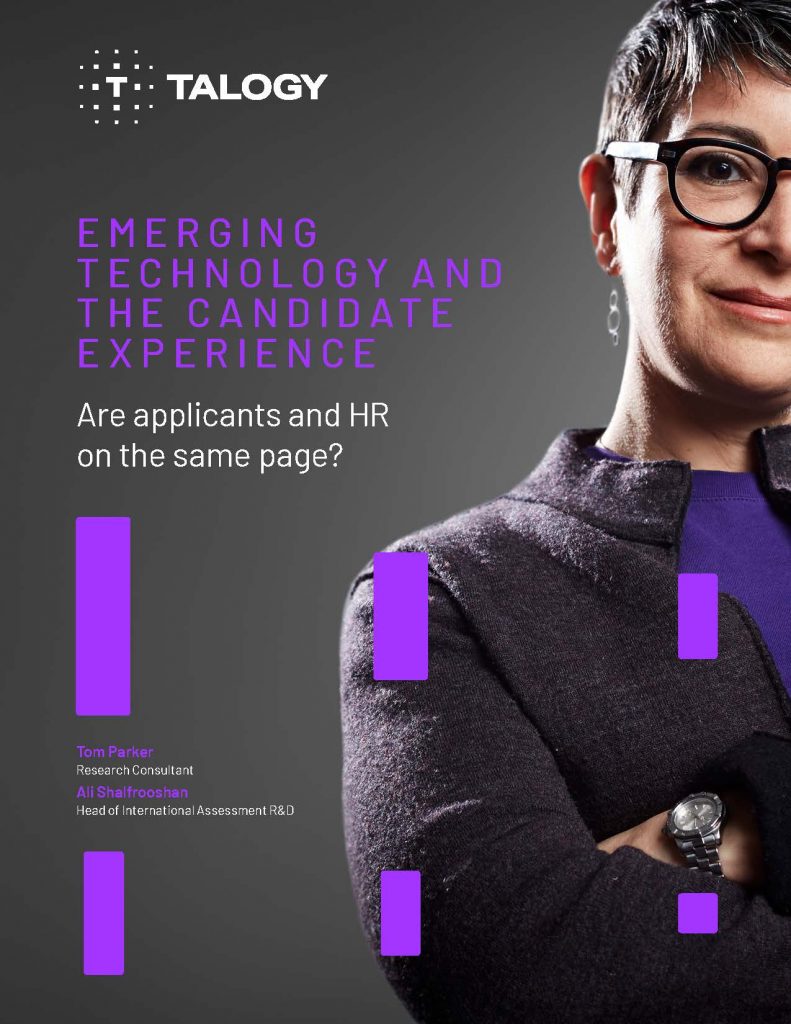Candidate experience and engagement

Jump to section:
- What is candidate experience and engagement?
- Why is candidate experience and engagement important?
- How can candidate experience and engagement be improved?
- Where can candidate experience be improved within the hiring process?
- Attract, engage, and match the best talent with Talogy Hire
- When should candidate experience and engagement be prioritised?
- Who can help to improve the candidate experience?
- Can there be too much focus on the candidate experience?
- Does a candidate’s age matter as it relates to experience and engagement?
- What is the ideal time duration of a candidate assessment?
- Emerging technology and the candidate experience
What is candidate experience and engagement?
The candidate experience is a broad term used to define how job candidates respond and react to all the engagements, assessments and interactions encountered during the hiring process. Looking at the candidate experience throughout the hiring journey is important because it can influence the candidate’s commitment throughout the process, overall impressions of the company, likelihood of sharing feedback publicly, intent to accept a job offer and much more.
Why is candidate experience and engagement important?
The candidate experience is important because it can have a direct influence on candidate attitudes, intentions and behaviours. While candidate experience is always important, it’s even more critical when there is a high volume of job openings and a low volume of available candidates. A positive candidate experience can encourage more applicants to apply, persist through the entire selection process and ultimately accept a job offer.
Where can candidate experience be improved within the hiring process?
The candidate experience can be improved in many stages of the selection process. A few examples include:
- Eliminate redundant or non-pertinent questions in the application.
- Try to keep the assessment to an acceptable length (30-50 minutes).
- Build in checkpoints to communicate with the candidate throughout the process.
- Provide them feedback as to where they stand in the process, as well as clear expectations of what may be happening next and when.
- Make the experience engaging by having updated technology and interactive steps.
- Have a consistent approach to interviewing, which includes having the interviewer be prepared and well-informed about the candidate.
While these are a few examples, it is clear that candidate experience can be improved across the entirety of the hiring process.
Attract, engage, and match the best talent with Talogy Hire
Learn how Talogy’s talent management solutions can help.
When should candidate experience and engagement be prioritized?
Increasing the candidate experience should always be a priority when developing a selection process. Candidate experience and engagement are even more important when the job market is tight, and employers are having to fight for viable candidates. A positive candidate experience can help companies retain candidates throughout the process and influence intentions to accept job offers.
Who can help to improve the candidate experience?
Everyone involved in the hiring process can have a direct influence on the candidate experience. Each step along the way and every candidate communication presents the opportunity to provide a great candidate experience. For example, a recruiter can provide timely and clear feedback to the candidate about where they are in the process and what to expect next. A hiring manager can come prepared to the interview by reviewing the candidate materials and following the standardised interview guide. Even individuals with a seemingly minor role in the process can leave a lasting impression on the candidate.
Can there ever be too much focus on the candidate experience?
A challenge that companies may face is that, in an effort to have a great candidate experience, they can lose sight of the ultimate goal in the hiring process: to gather objective, job relevant and reliable data points to help inform an accurate view of the candidate’s suitability for the role. For example, a company may focus on shortening the hiring process and assessments at a cost of not gathering all the accurate information needed. This could lead to inaccurate decisions about a candidate. Organisations need to find a balance between the candidate experience and measurement so that both parties come away from the process well informed and positive. It is important to focus on all aspects that could potentially impact the candidate experience, not just one, when making improvements to your process.
Does a candidate’s age matter as it relates to experience and engagement?
Overall, all generations value fairness and justice, which is key to a great candidate experience. However, our research shows that there may be some generational differences in how individuals may react to various elements of the assessment process. Compared to Millennials (born between 1981-1996), individuals in Generation Z (born in/after 1997) place less value on engaging experiences, are less likely to be positively impacted by tests that include audio/visual components, are more sceptical of game-based assessments and prefer shorter assessments (around 42 minutes compared to 49 minutes). These findings reinforce the notion that we should not sacrifice quality measurement for shiny new tools.
What is the ideal time duration of a candidate assessment?
We hear from recruiters, talent acquisition and other stakeholders that assessments should be short. We agree – to increase the candidate experience, assessments need to be short. However, short does not need to be under 30 minutes. Our research polling candidates showed that the sweet spot for assessment length is between 30 to 50 minutes. Why? Candidates want the ability to demonstrate their skills and abilities. A 15-minute assessment may not provide candidates with sufficient opportunity to show the company their capabilities. Furthermore, our assessment completion data support this. Candidates are just as likely to complete a 60-minute assessment as they are a 20-minute assessment. As such, shorter is not always better to enhance the candidate experience.

Emerging technology and the candidate experience
Candidates and HR: the connects, the disconnects, and what this means for organisations.
A critical area of interest for HR professionals and recruiters is the “candidate experience”; defined as the collective result of engagements, assessments and interactions that organisations have with candidates during the hiring process. Research by the Talent Board has identified that improving candidate experience is the top goal for recruiters in 2019. The importance of this issue is not limited to missing out on high potential talent but can impact financial business outcomes, for example Virgin Media estimated that they lost £4.4 million in revenue in 2014 due to poor candidate experience.

